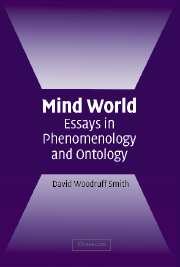Book contents
- Frontmatter
- Contents
- Prolegomena: The Terroir of Consciousness and the World
- Origins of the Essays
- Overview: A Story Line
- The Picture
- 1 Three Facets of Consciousness
- 2 The Cogito circa a.d. 2000
- 3 Return to Consciousness
- 4 Consciousness in Action
- 5 Background Ideas
- 6 Intentionality Naturalized?
- 7 Consciousness and Actuality
- 8 Basic Categories
- Coda: The Beetle in the Box
- Appendix: Background Conceptions of Ontology, Phenomenology, Philosophy of Mind, and Historical Philosophy
- Index
- References
3 - Return to Consciousness
Published online by Cambridge University Press: 05 June 2012
- Frontmatter
- Contents
- Prolegomena: The Terroir of Consciousness and the World
- Origins of the Essays
- Overview: A Story Line
- The Picture
- 1 Three Facets of Consciousness
- 2 The Cogito circa a.d. 2000
- 3 Return to Consciousness
- 4 Consciousness in Action
- 5 Background Ideas
- 6 Intentionality Naturalized?
- 7 Consciousness and Actuality
- 8 Basic Categories
- Coda: The Beetle in the Box
- Appendix: Background Conceptions of Ontology, Phenomenology, Philosophy of Mind, and Historical Philosophy
- Index
- References
Summary
Abstract. What makes a mental state conscious, according to the classical view (in Locke et al.), is a certain self-consciousness, or (as I prefer to put it) an inner awareness of the state. What is the form of that inner awareness? This is a difficult question, as we see by studying neoclassical models in Brentano, Husserl, and others. In recent philosophy of mind it has been proposed that this awareness of our experience consists in a higher-order monitoring. Yet there are problems with all higher-order theories of consciousness, as Brentano well observed. Here I pursue and partly revise my own earlier analysis of inner awareness as a “modal” character of mental acts. On that analysis, inner awareness is an integral part of an act of consciousness; it is not a higher-order act of any type (such as observing one's current thought or perception). On a particular account, this inner awareness may itself be grounded in the temporal flow of consciousness (extending Husserl's analysis of time consciousness). Yet, in the end, we should allow that lower forms of consciousness do not include the form of inner awareness typical of everyday human experience. Consciousness does not, then, reduce to inner awareness; instead we need a systematic classification of types and levels of consciousness, and we sketch the beginning of such a classification.
Segue. In “The Cogito circa a.d. 2000” we appraised the core elements of the Cartesian account of how consciousness is eo ipso a consciousness of its object and an awareness of itself. […]
- Type
- Chapter
- Information
- Mind WorldEssays in Phenomenology and Ontology, pp. 76 - 121Publisher: Cambridge University PressPrint publication year: 2004
References
- 8
- Cited by



